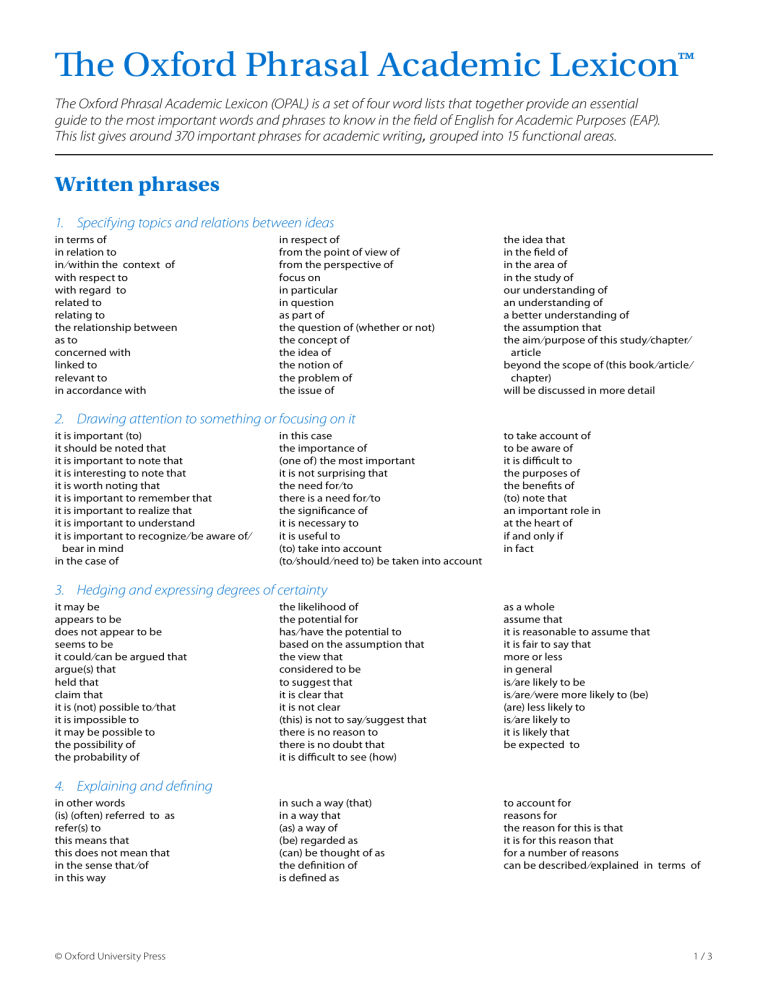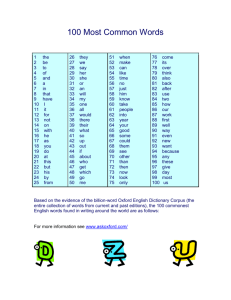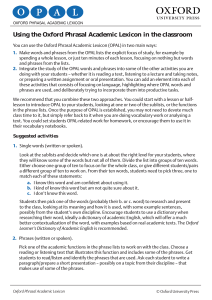
The Oxford Phrasal Academic Lexicon™ The Oxford Phrasal Academic Lexicon (OPAL) is a set of four word lists that together provide an essential guide to the most important words and phrases to know in the field of English for Academic Purposes (EAP). This list gives around 370 important phrases for academic writing, grouped into 15 functional areas. Written phrases 1. Specifying topics and relations between ideas in terms of in relation to in/within the context of with respect to with regard to related to relating to the relationship between as to concerned with linked to relevant to in accordance with in respect of from the point of view of from the perspective of focus on in particular in question as part of the question of (whether or not) the concept of the idea of the notion of the problem of the issue of the idea that in the field of in the area of in the study of our understanding of an understanding of a better understanding of the assumption that the aim/purpose of this study/chapter/ article beyond the scope of (this book/article/ chapter) will be discussed in more detail 2. Drawing attention to something or focusing on it it is important (to) it should be noted that it is important to note that it is interesting to note that it is worth noting that it is important to remember that it is important to realize that it is important to understand it is important to recognize/be aware of/ bear in mind in the case of in this case the importance of (one of) the most important it is not surprising that the need for/to there is a need for/to the significance of it is necessary to it is useful to (to) take into account (to/should/need to) be taken into account to take account of to be aware of it is difficult to the purposes of the benefits of (to) note that an important role in at the heart of if and only if in fact 3. Hedging and expressing degrees of certainty it may be appears to be does not appear to be seems to be it could/can be argued that argue(s) that held that claim that it is (not) possible to/that it is impossible to it may be possible to the possibility of the probability of the likelihood of the potential for has/have the potential to based on the assumption that the view that considered to be to suggest that it is clear that it is not clear (this) is not to say/suggest that there is no reason to there is no doubt that it is difficult to see (how) as a whole assume that it is reasonable to assume that it is fair to say that more or less in general is/are likely to be is/are/were more likely to (be) (are) less likely to is/are likely to it is likely that be expected to in such a way (that) in a way that (as) a way of (be) regarded as (can) be thought of as the definition of is defined as to account for reasons for the reason for this is that it is for this reason that for a number of reasons can be described/explained in terms of 4. Explaining and defining in other words (is) (often) referred to as refer(s) to this means that this does not mean that in the sense that/of in this way © Oxford University Press 1/3 5. Giving examples or presenting evidence such as for example for instance as in as shown in according to is/are shown in can be seen (as/in) it can be seen that as we have seen as we shall see it is easy to see that (is) an example of is a good example of show(s) that indicate(s) that has/have been shown to (be) it can be shown that it has been shown that have shown that evidence of/that/for data on research on support for it has been suggested that it has been argued that in some cases (by/from) the fact that are based on basis for can be found in (was/have been) found to be found that observed in tend to characterized by in the light of as in the case of this is (not) the case see also in the form of (as) a form of different types of a/the type of a kind of kinds of in a number of ways in a variety of ways in so far as 6. Expressing aims, causes and effects in order to so that (be/is) due to may be due to (be) due to the fact that as a result (of) is a/the result of result(s) in because of caused by the cause(s) of the effect(s) of the/an effect(s) on the impact of an impact on subject to depend(s) on dependent on determined by in response to the way(s) in which the manner in which is based on on the basis of/that (is/are/be) associated with association between involved in responsible for to ensure that tend(s) to be give rise to by means of lead(s) to can/may lead to so as to such that a change in is consistent with (as) a consequence of the consequences of (as) a means of the influence of is related to (as) a source of derived from can be used to can be applied to on the part of at the expense of for the purpose(s) of play a role in play(s) an important role (in) an important role to play in play a key role in an integral part of lies at the heart of in the event of have a significant impact on is the most common cause of difference(s) in a number of different different from variation in whether or not this is not the case not necessarily with the exception of while at the same time in spite of the fact that is not the same (thing) as the other end of the spectrum in much the same way (as) similar to (that of) consistent with the corresponding corresponding to the advantages and disadvantages of in addition (not only) but also and so on a combination of 7. Making contrasts rather than as opposed to in contrast to in contrast on the other hand on the one hand the difference between 8. Comparing compared with/to relative to in the same way (as/that) 9. Adding as well as as well 10. Expressing quantity/degree and increase/decrease the/a number of there are a number of the amount of the level of a high level of the rate of © Oxford University Press (in) a (wide) variety of (in) a/the (wide) range of in the range of a large number of a small number of an/the increase in The Oxford Phrasal Academic Lexicon™ increase in the number of a/the reduction in reduction in the number of the degree of the degree to which a high degree of 2/3 the extent of the extent to which to the extent that the size of the growth of the rise of high levels of a series of the most common is equal to a measure of the percentage of the/a proportion of the ratio of the total number of the frequency of the prevalence of one or more of by a factor of is a measure of in part of the total to a greater or lesser extent more/greater/higher/less/ lower than the presence or absence of the majority of the vast majority of in this chapter of this chapter in the previous/next section the following as follows the above the former/latter the work of in the literature et al at the beginning of in the past prior to (over) a period of time over time at the same time in turn the risk of (as/is) a function of the quality of the study of the application of the formation of the ability to/of the evolution of the creation of the distribution of the emergence of the meaning of the principle of the introduction of the analysis of the effectiveness of the performance of the implementation of the availability of the content of aspect(s) of characteristics of feature(s) of elements of he or she men and women 11. Expressing the existence/non-existence of something in the presence of the existence of (even) in the absence of (any) the/a lack of 12. Referring to the text and to other texts in the course of in this study of this study in the study 13. Referring to time in the future in recent years 14. Phrases with (the) (noun) of (by/with) the use of (in) the development of the role of the nature of the basis of the form of the value(s) of in the process of 15. Miscellaneous his or her OPAL has been created with reference to the following corpora: the Oxford Corpus of Academic English (OCAE), the fiction subcorpus of the Oxford English Corpus (OEC), the spoken element of the British National Corpus (BNC) and a subset of the British Academic Spoken English (BASE) corpus, developed within the University of Warwick and for which relevant permissions have been obtained. BASE was developed at the Universities of Warwick and Reading under the directorship of Hilary Nesi and Paul Thompson. Corpus development of BASE was assisted by funding from BALEAP, EURALEX, the British Academy and the Arts and Humanities Research Council. © Oxford University Press The Oxford Phrasal Academic Lexicon™ 3/3




